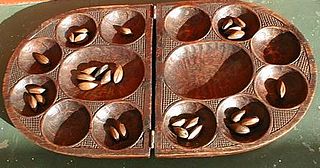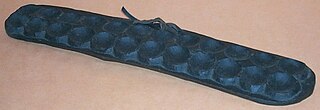
Mancala refers to a family of two-player turn-based strategy board games played with small stones, beans, or seeds and rows of holes or pits in the earth, a board or other playing surface. The objective is usually to capture all or some set of the opponent's pieces.

Oware is an abstract strategy game among the mancala family of board games played worldwide with slight variations as to the layout of the game, number of players and strategy of play. Its origin is uncertain but it is widely believed to be of Ashanti origin.

Kalah is a modern variation in the ancient Mancala family of games, the oldest known version having been found carved into a stone tablet in the 16th-century BCE pyramid of Cheops. The Kalah variation was developed in the United States by William Julius Champion, Jr. in 1940. This game is sometimes also called "Kalahari", possibly by false etymology from the Kalahari desert in Namibia.

Omweso is the traditional mancala game of the Ugandan people. The game was supposedly introduced by the Bachwezi people of the ancient Bunyoro-kitara empire of Uganda. Nowadays the game is dominated by Ugandan villagers. It is a very hard and fast game said to keep one's mind high and ever excited, which can make it addictive. The equipment needed for the game is essentially the same as that of the Bao game. Omweso is strictly related to a wide family of mancalas found in eastern and southern Africa; these include Coro in the Lango region of Uganda, Aweet in Sudan, ǁHus in Namibia, Kombe in Lamu (Kenya), Mongale in Mombasa (Kenya), Mongola in Congo, Igisoro in Rwanda, and Kiela in Angola.
Ba-awa is a variant of the game of mancala originating in Ghana. Although played in some of the same regions as Oware, it is simpler and in traditional societies is considered a game for women and children. Ba-awa is related to games j'erin and obridjie played in Nigeria. It is also similar to mancala game anywoli played at the Ethiopian-Sudanese border.

Bao is a traditional mancala board game played in most of East Africa including Kenya, Rwanda Tanzania, Comoros, Malawi, as well as some areas of DR Congo and Burundi. It is most popular among the Swahili people of Tanzania and Kenya; the name itself "Bao" is the Swahili word for "board" or "board game". In Tanzania, and especially Zanzibar, a "bao master" is held in high respect. In Malawi, a close variant of the game is known as Bawo, which is the Yao equivalent of the Swahili name.

Owela, also referred to by the Khoekhoe language loanword hus, is the Oshiwambo name of a traditional mancala board game played by the Nama people, Herero people, Rukwangali speakers, and other ethnic groups from Namibia. It is related to the Omweso family of mancala games played in Eastern and Southern Africa. Although this is an abstract strategy game, the consequences of individual moves are so hard to predict that it can be considered, to some extent, a game of chance.

Lothar Meggendorfer was a German illustrator and early cartoonist known for his pop-up books.
Daramutu is a traditional mancala game from Sri Lanka. It was first described in 1909 by the British engineer Henry Parker in his book Ancient Ceylon (1909). Traditionally, the game is only played by women.
En Gehé is a traditional mancala game played by the Loitha and Kisonga Maasai groups of northern Tanzania. The game was first described in 1904 by a German soldier, Moritz Merker, who was serving in the Kaiserlichen Schutztruppe in German East Africa. Merker later became the first ethnologist to study the Maasai culture.

Enkeshui is a traditional mancala game played by the Maasai of both Kenya and Tanzania. It is a rather complex mancala game, and bears some similarities to the Layli Goobalay mancala played in Somaliland.
Isolo is a traditional mancala game played by the Sukuma people in northern Tanzania. The rules of the game come in three variants, respectively for women, boys and men.
Kiothi is a traditional mancala game played by the Meru people in Kenya. The word "kiothi" simply means "to place". This mancala is closely related to the Enkeshui and the Giuthi mancalas, respectively played by the Maasai and the Kikuyu.
Lamlameta is a traditional mancala game played by the Konso people living in the Olanta area of central Ethiopia. It was first described in 1971 by British academic Richard Pankhurst. It is usually played by men. The name "Lamlaleta" means "in couples".

Mangala is a traditional Turkish mancala game. It is strictly related to the mancala games Iraqi Halusa, Palestinian Al-manqala, and Baltic German Bohnenspiel. There is also another game referred as Mangala played by the Bedouin in Egypt, and Sudan, but it has quite different rules.
Mbothe is a traditional mancala game played by the Pokomo people that live along the Tana River, in Kenya. Pokomo do not traditionally build gameboards; they dig pits in the ground and use small stones as counters.
La'b Madjnuni, also known as Crazy Game, is a mancala game played in Damascus (Syria) in the late 19th century.

Toguz korgool or togyzkumalak, is a two-player game in the mancala family that is played in Central Asia.

Gerhard Zwerenz was a German writer and politician. From 1994 until 1998 he was a member of the Bundestag for the Party of Democratic Socialism (PDS).
Association football club RB Leipzig-affiliated teams include a reserve team, women's team, and junior and academy teams.









